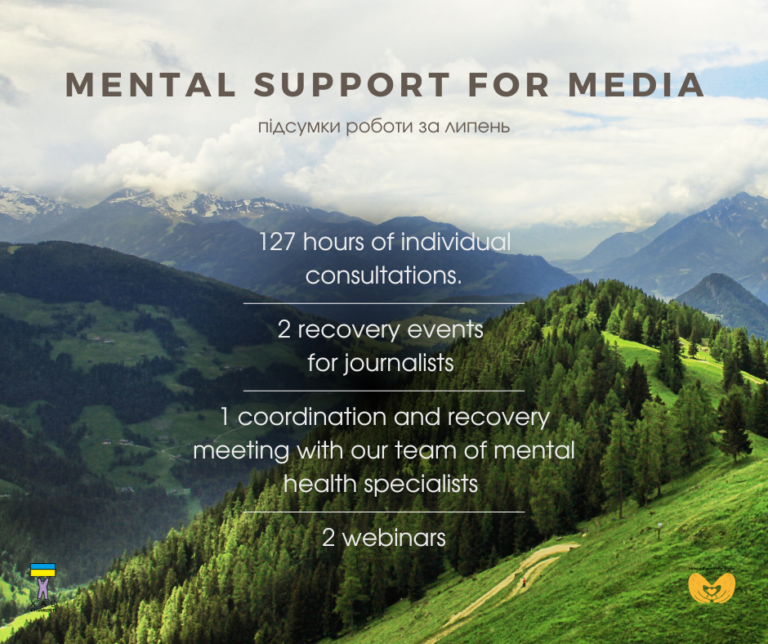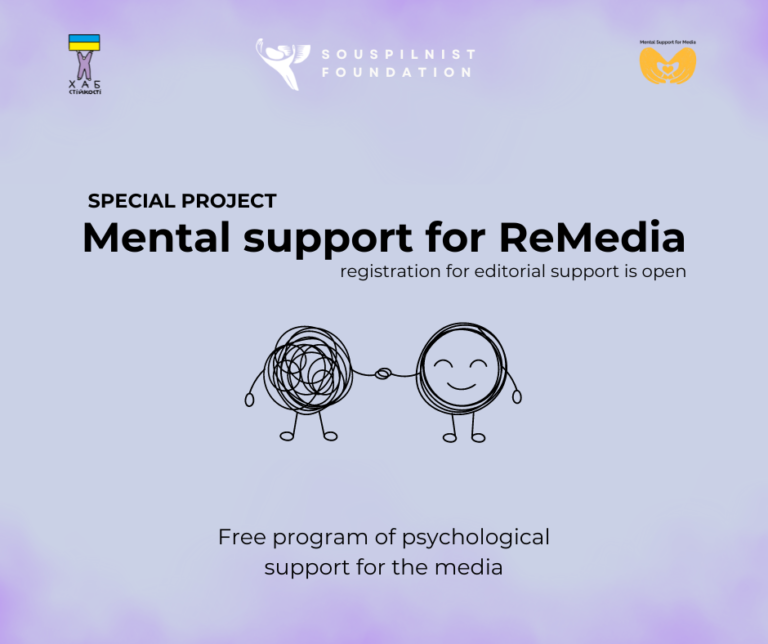Getting journalists mentally ready for writing a piece of difficult material, creating an atmosphere of emotional security within the team, learning how to stand their ground and say no: the experts sought for solutions on how those working in the media should take care about mental health.
On November 27, an expert discussion on ”How journalists/newsrooms should take care of mental health and corporate communications: asymmetric solutions” was held in Zoom.
The event was organized by Souspilnist Foundation, with the support of Detector Media, Internews Ukraine, the Independent Media Council, editors and other media community representatives of the country.
The invited speakers included: Marharyta Tulup, free-lance journalist working on the guide on covering mental health in the media, Khrystyna Kolesnyk, psychologist, head of UCU’s Mental Health in Organizations program, Anastasiia Nizhnik, executive director at NGO Vidkrytyi Prostir, author of the course in caring about mental health in organizations, Olena Diveyeva-Ostrovska, CBT psychotherapist, founder of the Psychotherapy and Personality Development Center “Inner Surfing”, Mariia Zhartovska, independent journalist, formerly at Babel, Ukrayinska Pravda, Forbes, Focus, Anhelina Kariakina, journalist and editor, Mariia Pysarenko, news correspondent at Channel 5, and Nataliia Onysko, co-editor of the Nashi Hroshi.Lviv project.
During the meeting, the media experts shared their own experience of working in a state of perpetual stress, talking about the factors helping normalize the condition and those deteriorating it, while the psychologists and psychotherapists spoke about the practices helping maintain mental health of an individual in particular and of a newsroom in general.
Anhelina Kariakina singled out several factors that negatively affect journalists’ mental health, in particular those working in independent media mostly covering difficult social issues.
In the first place, there is often no understanding that journalists, like all others, suffer stress, are worried about the heroes, and take some topics hard:
“We (at Hromadske.TV, – SF) have come to the realization that in practice, we should get the journalists ready for preparing difficult materials beforehand, and talk to them, and then provide a feedback afterwards. Journalism is about working with people. You’re a person dealing with another person – consequently, both of you are part of a story and should come out unscathed.”
The journalist also noted that it is important to talk about Ukraine being a special place for journalistic work: we live in a country where a war is taking place, and a country with very short political and information cycles.
“The employee turnout is very high, many “hop off”, because it’s hard to stay in this field for a long time, it’s hard to make money, hard to find self-fulfillment.”
The journalist also noted the problem of inequality in the media field, since journalism is a low-paid area of work, where mostly women work.
Marharyta Tulup shared that, as a journalist at Slidstvo.Info, she was doing the project “Pravosyllia” about tortures in prisons and detention centers. When Marharyta began telling her journalist colleagues about psychological problems, she heard degrading.
“It seems to me that, to some extent, it’s got to do with the fact that there’s some sort of workaholism-related competition among journalists. We seem to constantly think that you’re working well and you’re a cool journalist only if you work a lot and intensely – we’re taught so from the start”.
Marharyta Tulup has not worked in the field for a year – she has opted for psychological comfort.
The experts noted that the issue of the difficulties of building corporate communications and maintaining the employees’ mental health in particular has to do with stigmatizing mental illness.
Khrystyna Kolesnyk mentioned inquiring how someone is feeling among the simple and effective tools for maintaining mental health in newsrooms.
“We don’t have to be psychologists to use this tool – just come up and ask how someone is feeling. And it’s important to be able to bear the truth, which may sound as “I’m feeling terrible.”
To hear the experts’ advice and experiences, watch the recording:
This event is made possible with the support of USAID-funded Media Program in Ukraine, implemented by Internews and with the help of private patrons.


